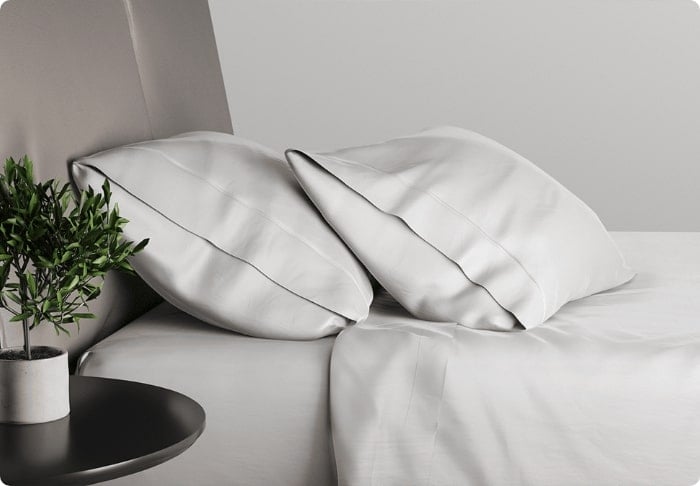Key Takeaways
- Importance of Regular Washing: Regularly washing your bed sheets is crucial to maintain a hygienic sleeping environment. Sheets can accumulate skin flakes, body oils, sweat, saliva, and even dust mites, making them a breeding ground for allergens. Washing sheets helps prevent the buildup of these allergens and ensures a cleaner, healthier sleep surface.
- Recommended Washing Frequency: Experts recommend washing your sheets once every week to maintain cleanliness and minimize allergen exposure. However, if you sleep alone and don’t use the bed every day, you can extend the washing interval to once every two weeks. Try to change sheets fairly often, as doing otherwise can lead to the accumulation of dead skin cells, body fluids, and dust mites.
- Health Benefits of Clean Sheets: Washing your sheets regularly not only promotes good hygiene but also enhances sleep quality. Clean sheets reduce the risk of allergies, asthma triggers, and skin issues. Moreover, fresh sheets are more inviting and can improve your overall sleep experience, making it easier to fall asleep and enjoy a comfortable night’s rest.
Most of us usually wash our clothes after a couple of times wearing them but do we do the same for our bedsheets? Like our clothes, we spend a good amount of time wrapped up in our sheets—between 6 to 9 hours a night.
Though they stay within the bedroom, your bedsheets could be a cesspool of germs. Contrary to our clothes collecting bacteria from outside, bedsheets are not exposed to the outside world; however, dirt and grime can still collect on them. Leaving us to wonder, how often should you wash your sheets to get clean, hygienic sleep?
Why Is It Important to Wash Your Sheets?
Skin flakes, body oil, sweat, saliva— body fluids lying on your bed make it a perfect breeding ground for allergens. It is important to wash your sheets regularly to prevent a build-up of all these allergens and to provide a more hygienic surface for sleeping.
An average adult sheds 1.5 grams of skin in a day and given the hours you spend in bed, a lot of those dead skin cells end up on your sheets. Your skin cells are the perfect meal for dust mites—tiny, microscopic insects that feed on skin flakes and multiply in millions on your bedsheets. Dust mites and their waste are the most common trigger of year-round allergies and asthma, including runny nose, sneezing, coughing, and itchy skin, nose, mouth, or eyes.
They thrive on temperatures between the mid-60s to mid-70s, which is also the recommended temperature setting for optimal sleep. Your bedsheets are the perfect environment for dust mites to thrive, with ideal temperature settings and a bountiful supply of skin cells (that replenish with each sleep).
What Is the Magic Number to Keep Sheets Clean?
Most experts in the area of dermatology and microbiology suggest washing your bedsheets once every week. If you are sleeping alone and not using the bed every day, you may extend it to once every two weeks, but the ideal recommendation is washing your sheets once every seven days.
According to a survey, Americans change their bedsheets roughly once every 24 days, which is way less than the ideal frequency at which they should be washed. In fact, the maximum number of days people can go without changing their sheets before it’s considered gross is 35 days. By then your bedsheets will have accumulated over 30 grams of dead skin cells, 2 gallons of body fluids (including sweat and saliva), and over a million dust mites, including their waste.
Washing your bed sheets every seven days ensures clean sheets, preventing pile-ups of unwanted allergens. It also keeps your sweat from leaving stains, which can save you from having to work to whiten your sheets. According to a National Sleep Foundation (NSF) Bedroom Poll Report, 71 percent of people acknowledge getting a more comfortable night’s sleep on sheets with a fresh scent.
Washing sheets regularly is not only good hygiene but it may also improve your sleep quality. More people feel excited about going to bed on fresh sheets. Clean bedsheets invite sleep, which serves to boost your sleep quality.
What Happens If You Don’t Wash Your Sheets?
If you don’t wash your bed sheets regularly, you’ll continue to sleep on dirty sheets, which may trigger allergies like runny nose, coughing, sneezing, itchy skin, and watery eyes. Dust mites can also aggravate asthma and may trigger an asthma attack.
If you sweat at night, the moisture enhances the humidity level in your sleep environment and provide a perfect ambiance for not just dust mites, but for bacteria and fungi to thrive. These could worsen allergic reactions or skin rashes.
If you or someone you share the bed with is sick, wash the bedsheets, otherwise, the sickness could come back. The germs stay on the sheets, and unless washed, they may re-enter your body causing a relapse of the infection.
How to Wash Your Sheets
To remove dust mites, skin cells, and bacteria, wash your bedsheets in scalding hot water to ensure that pathogens are destroyed. Follow it by drying on the highest possible setting or line dry outside—the sun’s rays have anti-microbial properties that will kill any remaining pathogens.
Before tossing your sheets into the washing machine, make sure you read the instructions on the care label. Sometimes you may not be able to wash fancy, colorful bedsheets in hot water. Try to wash them at least in warm water. If that’s not an option, dry the bedsheets in the sun and then follow up by ironing—the heat sanitizes the material and gives it a smoother look.
Try to avoid washing sheets with clothes and other items, as this can affect how well the sheets are washed and can even lead to fiber damage.
Consider Amerisleep Machine-Washable Sheets
Not only do our sheets offer luxurious feels with natural materials and breathable weaves, but they’re also quite easy to care for and keep pristine. Simply toss them in the machine and wash on a gentle cycle with mild detergent.
Quick Guide: A 30-Second Summary
| Best Machine-Washable Cotton Sheets | Amerisleep Cotton Sheets |
| Best Machine-Washable Tencel Sheets | Amerisleep Tencel Sheets |
| Best Machine-Washable Bamboo Sheets | Amerisleep Bamboo Sheets |
More Guides to Cleaning Bedding & Mattresses
While clean sheets are an important part of a comfortable mattress surface, they’re not the only part worth considering. You’ll also want to make sure you have clean pillows, comforters, and a clean, fresh-smelling mattress. Even a mattress protector benefits from an occasional cleaning.
For mattresses:
- How to Get Stains Off and Clean a Mattress
- How to Freshen and Deodorize a Mattress
- How to Remove Urine Stains and Smell From a Mattress
- How to Clean Vomit from a Mattress
- How to Remove Blood Stains on Your Mattress
- How to Get Poop Stains out of a Mattress
- How to Remove Makeup Stains from Mattresses
- How to Remove Coffee Stains from Your Mattress
- How to Remove Rust Stains on a Mattress
- How to Get Sweat Stains Out of a Mattress
- How to Clean a Dusty Mattress
- How to Fix a Ripped Mattress
- How to Get Lint Balls off a Mattress
- How to Dry a Wet Mattress After Water Damage
For pillows:
For blankets and other coverings:
- How to Clean a Comforter
- How Long Does It Take to Dry Clean a Comforter?
- How to Wash a Quilt
- How to Wash a Duvet
- How to Clean a Weighted Blanket
- How to Clean an Electric Blanket Safely
- How To Wash a Crochet Blanket
For other items of bedding:
- How Often Should You Wash Your Mattress Protector?
- How To Clean a Memory Foam Mattress Topper?
- How to Clean an Upholstered Bed Frame
- How to Get Pet Hair Out of Bedding
FAQs
How often do people buy new bedsheets?
It depends on the quality of your bedsheet and how you care for it. Sometimes frequent washing and high-temperature dryer settings may loosen the elastic of the fitted sheets making them inefficient, or colors may start fading. Part of good housekeeping is to follow the instructions on the care label and wash them once every seven days. Sometimes with proper maintenance, good quality bed sheets last as long as 20 years, while some others may not last more than a year.
How often should I wash mattress protectors, blankets, and pillows?
Mattress protectors may be washed once every two months, while blankets and comforters may be washed on the delicate cycle once every season. Even pillows should be washed once or twice a year to maintain proper bed hygiene.
Conclusion
Your bed linens may pose a health risk if you don’t clean them often. Though it may seem like a hassle, washing your sheets every seven days offers extra health benefits and provides a clean, fresh sleep surface. This extra washing is totally worth it.
About the author
Sanchita Sen is a full-time writer focusing on the sleep health and mattress industry. She is a former journalist who has written numerous articles on the healthcare sector. Some of the topics she has covered include how to lucid dream, fever dreams, melatonin for sleep, and best gel memory foam mattress. Sanchita holds a Master of Arts in Communications from Convergence Institute of Mass Media and Information Technology Studies. She is also a published author, who seeks inspiration from both real life and the world of fiction.
View all posts




